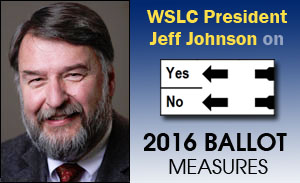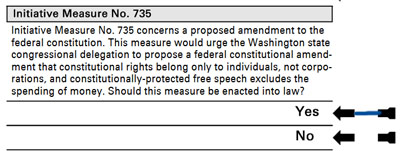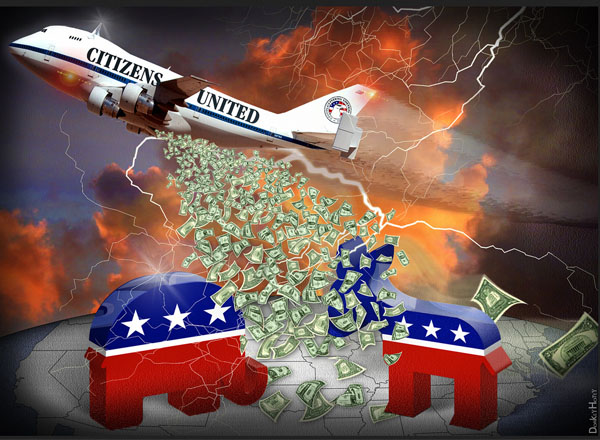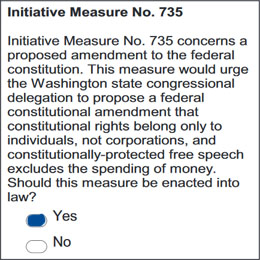ELECTION
YES on 735: The road to restoring democracy
 By JEFF JOHNSON
By JEFF JOHNSON
One in a series of columns
on ballot measures
(Oct. 11, 2016) — Money in politics has always been a problem in the United States. But now with income and wealth inequality rivaling what it was during the gilded age and a couple of recent U.S. Supreme Court decisions, our democracy is in crisis.
The following has been attributed to Justice Louis Brandeis early in the last century: “We can have democracy in this country or we can have great wealth concentrated in the hands of a few, but we cannot have both.”
Justice Brandeis was all too aware of the special privilege, bribery, and corruption that was bought and paid for by the “Robber Barons” of industry during the first gilded age. Today we have a similar dilemma.
When a dangerously idiosyncratic, misogynistic, racist, and xenophobic billionaire candidate like Donald Trump can have an outsized influence on the race for the presidency and the Koch brothers, the second wealthiest family in America, can spend nearly $1 billion on the 2016 elections, we are in deep trouble. We need what Bernie Sanders has repeatedly called for: a “political revolution” in this country.
 Initiative 735 (WAmend) is a positive first step towards restoring democracy in the United States.
Initiative 735 (WAmend) is a positive first step towards restoring democracy in the United States.
I-735 calls for Congress to pass a constitutional amendment to overturn Citizens United and related campaign finance decisions by the U.S. Supreme Court and declare that “constitutional rights belong only to individuals, not corporations, and constitutionally protected speech excludes the spending of money.”
On Jan. 21, 2010, the U.S. Supreme Court in a 5-4 decision upended 100 years of national policy and decades of court precedent that prohibited corporate money in politics in Citizens United v. Federal Elections Commission.
 Citizens United found that the ban on corporate political spending violated their First Amendment free speech rights, thereby giving corporations the right of personhood and defining money as speech. The only caveat was that that political spending not be coordinated with political campaigns — that is the spending needed to be done independently from the candidates they were advocating for.
Citizens United found that the ban on corporate political spending violated their First Amendment free speech rights, thereby giving corporations the right of personhood and defining money as speech. The only caveat was that that political spending not be coordinated with political campaigns — that is the spending needed to be done independently from the candidates they were advocating for.
Two months after the Citizens United, the Speechnow.org v. Federal Elections Commission decision allowed corporations and super PACs (political action committees) to spend unlimited amounts of money on campaigns, so long as they were done independently of campaigns and that they disclose their donors.
Well sort of. The rules through which organizations form into Limited Liability Companies, 501(c)(4)s, and 527s allow organizations to mask actual donors. So when organizations give to Super PACs it is hard, if not impossible, to figure out the individuals and companies that actually contributed the money.
What Citizens United also did was to narrow the definition of political corruption and influence to “quid pro quo” corruption — bribery. This overturned the precedent passed by the U.S. Supreme Court in 1976, shortly after the Watergate political scandal, in Buckley v. Valeo that stated “the giving and taking of bribes deal only with the most blatant and specific attempts of those with money to influence government action.” The Buckley decision went on to posit that corruption was inherent in a system of unlimited political contributions.
So in about six short years we now have a political contribution system that allows corporations and wealthy individuals to give huge undisclosed piles of cash in an effort to elect various candidates and issues that will ensure that corporate interests dominate our political stage.
 Diane Jones, an IBEW 46 member and WAmend coordinator, said in these pages earlier: “This country has gone back to the days when a handful of elites and big corporations controlled government. Their interests are profit-driven and contrary to what is best for working people and society.”
Diane Jones, an IBEW 46 member and WAmend coordinator, said in these pages earlier: “This country has gone back to the days when a handful of elites and big corporations controlled government. Their interests are profit-driven and contrary to what is best for working people and society.”
Please join Diane Jones and the Washington State Labor Council, AFL-CIO and vote YES for democracy. Vote YES on Initiative 735.
Jeff Johnson is President of the Washington State Labor Council, AFL-CIO, the largest labor organization in the Evergreen State, representing the interests of more than 600 local unions and approximately 450,000 rank-and-file union members. This is one of a series of columns by Johnson about state and local ballot measures for 2016.





